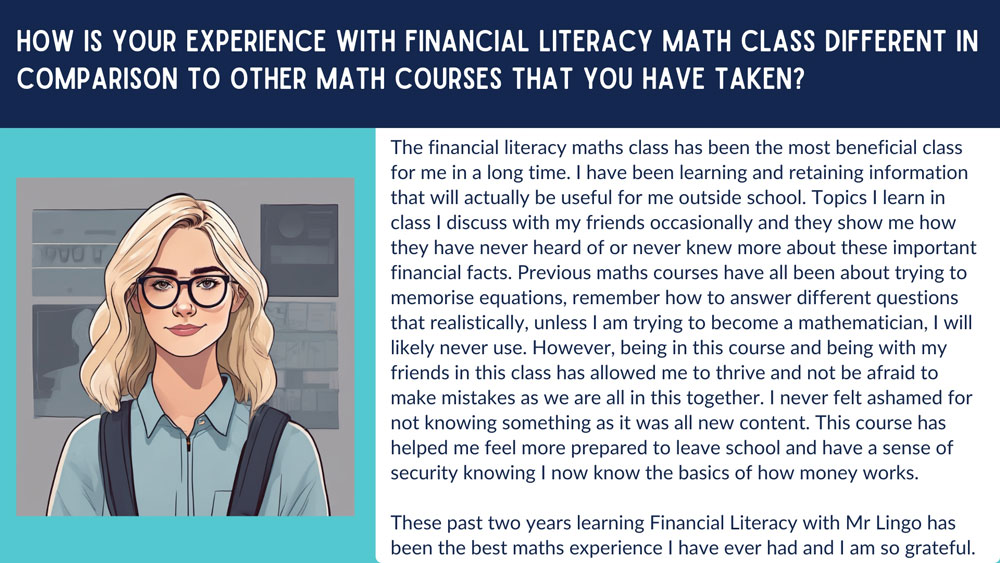
“Student Agency boils down to students having a voice in the classroom…” -Laurie Manville and Dr. Alva Lefevre
Towards the end of the 2022-2023 school year, my class roster started to grow. Students that chose to withdraw from International Baccalaureate (IB) classes were transferred to our math class feeling defeated. It was painful to witness how students didn’t fully realize that curriculums are not one-size-fits-all and there are many opportunities for them to be successful given the right placement. My class was mainly seen as credit recovery, a tick mark to complete the required units for graduation. It was a hard sell to keep them motivated and to top it all off, our first order of business was to administer a diagnostic test and discuss their challenges. That’s when I knew something had to change.
I had an ambitious goal: to co-construct a math class from scratch with our seniors. My students and I brainstormed, planned, and questioned what they wanted to gain from a math class. This reflection was a healing process as they slowly realized that the respective pathways they were choosing (sailing, theater, social work, etc.) did not require extensive math skills.
Creating this course became my passion project over the summer break. After my students finish a task, I always ask them, “Is this something you’re proud of?” This very same prompt resonated in my head - I wanted to build something that I would be proud of and that my students would be proud of participating in. I wanted to create a robust and rigorous class wherein they felt challenged but not debilitated or bored while seeing the value and connection on the units we discuss throughout the year. I reached out to former colleagues and spent some of my afternoons reading Building Thinking Classrooms in Mathematics by Peter Liljedahl. I must admit that there were days when I thought to myself, “What did I get myself into?” Fostering a new routine while building, learning, and editing materials was quite overwhelming.
While difficult, there were many good days when my class was engaged in a roundtable discussion on emergency funds or the effects of inflation. On other days, they were engrossed in computing compound interest and arguing why credit cards are a bad idea over personal loans. Our course covered basics of money, credit, investing, and personal beliefs influencing money decisions.
On our last week of instruction, one of my students wrote in her reflection, “These past two years learning Financial Literacy with Mr. Lingo has been the best math experience I have ever had and I am so grateful.” This just pierced through my heart. It took me back to our first days together when my students were enveloped by anger, disappointment, or self-doubt. Now, they walked away engaged with pride and prepared for the years beyond high school.
 Student reflection. (Photo source: Jerome Lingo)
Student reflection. (Photo source: Jerome Lingo)The Power of Choice
Our course was anchored to what they wanted to gain from it. Co-constructing a class gave our students an instant buy-in which was challenging to achieve in many of the classes. Knowing that this might not be possible in several contexts but giving our students power over which activity they wanted to do next was important. Did they want to spend the next lesson reviewing or give options in taking down notes. The power of choice is a nod to our students that they are in control and clearing the path for them to take full ownership of their learning.
Everybody Wants To Do Well
A lot of our students came to our class and said, “I don’t really care about this class” or “I am not even trying.” This may stem from pre-empting all the anxieties and negative emotions from failure. Once students see pockets of success, they will be invested. Make sure to celebrate these successes no matter how big or small. Highlight a student’s project when discussing the rubrics. Synthesize a student’s solution when revising the test. It’s through these moments that they regain their confidence and slowly we validate that they truly care about their growth and development.
Finding Balance
Lastly, the key is finding the right balance. Our instructional decisions should revolve around finding the appropriate challenge for our students. Design tasks and evaluations that are not too easy that they will be bored but also create scaffolds that will not be too difficult wherein they would freeze and be overwhelmed. This may entail constant changes in the curriculum such as providing extension questions, reteaching of previous concepts, visual representations for understanding and many more. When the challenge is balanced, the motivation will not be sacrificed.
As I write this article, I am pondering again if this is something I am proud of. One hundered percent! This professional milestone was worth every minute of preparation, and I would like to give a huge shout out to the class of 2024 for creating a classroom that brings out the best in each other.
Financial Literacy Reflections:
https://drive.google.com/drive/folders/1wofMXYTGCyLlX7oWS9ZRBrghrzDzTWGN?usp=sharing
Raw Reflections:
https://docs.google.com/spreadsheets/d/1DhT4xMrs--ykByf-IyvQP9WDm037MwhVu97o00JMqqU/edit?usp=sharing
--------------------------------------------------------------
Jerome Lingo is an international educator currently residing in Hong Kong. He was born and raised in Manila and is a proud Filipino. With 16 years of international teaching experience, he taught in several international schools across the globe, namely, International School of Manila (Philippines), International School of Tanganyika (Dar es Salaam, Tanzania), and Academia Cotopaxi (Quito, Ecuador), where he co-built the first intensive learning support program in South America and had the privilege to present among other educators in Association of American Schools in South America (AASA) conference in Rio de Janeiro, Brazil. He is also serving as the Marketing and Communications Director for SENIA (Special Education Network and Inclusion Association) International Board.